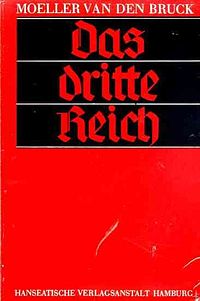- Das Dritte Reich
-
"Das Dritte Reich" redirects here. For Germany under Hitler's government, see Nazi Germany."Das Dritte Reich" redirects here. For other uses, see Das Dritte Reich (disambiguation).
Das Dritte Reich ("The Third Reich") is a 1923 book by German author Arthur Moeller van den Bruck, the ideology of which heavily informed the Nazi party. The book formulated an "ideal" of national empowerment, which resounded throughout a Germany desperate to rebound from the Treaty of Versailles: Das Dritte Reich was Germany's Third Rome.
For Moeller van den Bruck, Germany's great misfortune lies in the political system created by the Weimar Republic, one of competitive parties and liberal ideologies. An admirer of Benito Mussolini, he looks for a strong leader.
Contents
The concept
His Reich is not so much state in the sense that term is usually understood: it is the ideal condition, the only way in which the scattered German people can achieve a common purpose and destiny. But he does not look for the limited state, the Second Reich fashioned by Bismarck was an imperfect empire. It did not include Austria which survived on from "our First Empire", side by side with "our Second Empire". Our Second Empire was a Little-German Empire which we must consider only as a stepping stone on our path to a Greater German Empire."
The weak Weimar Republic, he argues, will have to be replaced by a new revolution, a revolution from the right. He looks also for a new political movement that will embrace both socialism and nationalism, a unique form of German Fascism. He takes all of his philosophical cues from the work of Nietzsche "who stands at the opposite pole of thought from Marx." The one contemporary politician he admires above all others is Benito Mussolini.
Implications
The temptation is to see this difficult little book as an advocate for what was to come; but this gap between the ideal vision and the historical truth is virtually unbridgeable. On the eve of publication Moeller van den Bruck inserted a preface, in which he wrote that "The Third Reich is a philosophical idea not for this but for the next world. Germany might perish because of the Third Reich dream." He believes Germany needs an Übermensch (Superman) in the fashion described by Nietzsche, but that Superman is not Adolf Hitler.
Soon after the collapse of the Munich Putsch he wrote: "There are many things that can be said against Hitler, and I have sometimes said them. But one thing you have to give him credit for: he is a fanatic for Germany. But he is wrecked by his proletarian primitive ways. He does not know how to give an intellectual basis to his Nazi party. Hitler is all passion, but lacks sense or proportion. A heroic tenor, not a hero." Hitler, in other words, was not Mussolini. These were the last words he ever wrote before his suicide in 1925.
References
- Fritz Stern. The Politics of Cultural Despair: A Study in the Rise of the Germanic Ideology. University of California Press, 1974. ISBN 0520026268
External links
Categories:- 1923 books
- German books
Wikimedia Foundation. 2010.

